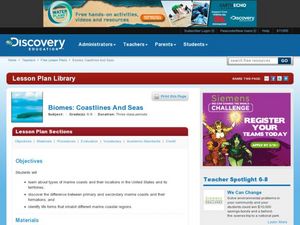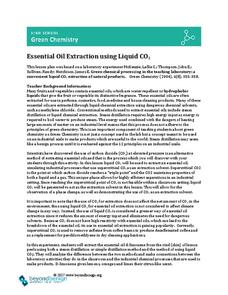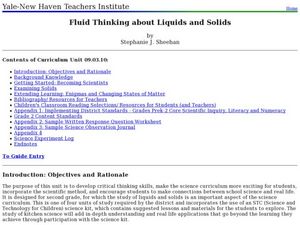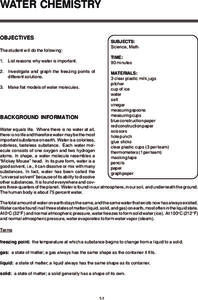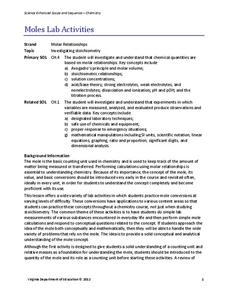Baylor College
Neural Network Signals
Using a simple circuit with the battery representing the brain, future physiologists test to see which solutions conduct electrical "nerve impulses." Enlighten learners with plentiful information on electric signals in the nervous system...
NOAA
I Can't Breathe!
The Gulf of Mexico dead zone, an area of low oxygen that kills marine life, costs the United States $82 million every year. Young scientists research anoxic ocean environments then come up with a hypothesis for the cause of the Gulf of...
Curated OER
Biomes: Coastlines and Seas
Students study the different types of coastlines and their territories. In this marine coasts lesson students identify life forms that are in the coastal regions.
Teach Engineering
The Great Pacific Garbage Patch
The Great Pacific Garbage Patch is one of several garbage patches around the world where garbage accumulates naturally. As part of a GIS unit that combines oceanography, environmental science, and life science, class members investigate...
Beyond Benign
Puzzler
Are some packaging materials superior to others? Using sustainability as a guide, scholars analyze different packing materials to describe their life cycles. They create puzzles to communicate their findings.
Curated OER
Science Lessons for Grade 11
Students explore different activities in biology, physics and chemistry. In this science lesson, students examine chromosomes using a microscope and explain their significance in sustaining life on Earth. They investigate alkanes and...
Beyond Benign
Essential Oil Extraction Using Liquid CO2
When life hands you lemons ... experiment on them! Green chemistry gurus compare extraction methods for essential oils through a lab activity. Lab groups use traditional distillation and liquid carbon dioxide extraction methods, then...
Curated OER
The Chemistry of Bigger Bubbles
Fourth graders explore properties of bubbles. In this lesson about bubbles, 4th graders perform an experiment. Students analyze the properties of bubble making substances and surface tension. Students create a square bubble. Students...
Curated OER
Light Stick Chemistry
In groups of three with the lights off and the shades drawn, investigators place inactivated light sticks, in three beakers: one filled with ice water, another with lukewarm water, and the other with room temperature water. They wait...
Curated OER
Chemiluminescence
Students explore chemiluminescence through various experiments. In this chemistry instructional activity, students explain the chemical reaction that drives the process. They give real life applications of chemiluminescence.
Curated OER
Water Chemistry
Students engage in a lesson that is concerned with the concept of water chemistry. They conduct research using a variety of resources. Students also consider an experiment to observe how water has the abiility to exist as three different...
Curated OER
How Are Polymers Utilized in Everyday Life?
Students identify the different types of polymers. For this chemistry lesson, students research information about an area of polymer science they chose. They create a PowerPoint presentation to share their findings in class.
Virginia Department of Education
Thermochemistry: Heat and Chemical Changes
What makes particles attract? Here, learners engage in multiple activities that fully describe colligative properties and allow the ability to critically assess the importance of these properties in daily life. Young chemists conduct...
Curated OER
Coasts
Students explain the different types of marine coasts and where they are located in the United States and its territories. They explain and identify some of the life forms that inhabit different marine coastal regions.
Curated OER
Introduction to the Periodic Table of Elements
Learners explain how the elements are arranged in the periodic table. In this chemistry instructional activity, students determine the subatomic particles for certain elements. They research the physical and chemical properties of an...
Curated OER
Fluid Thinking About Liquids and Solids
Second graders examine the physical characteristics of the different states of matter. For this chemistry lesson, 2nd graders observe how matter changes from one phase to another. They classify substances according to its type of matter.
Curated OER
Half Lives
Students investigate the concept of half-life by conducting an M&M experiment. In this chemistry lesson, students differentiate nuclear fusion and fission. They present investigation findings to class.
Curated OER
WATER CHEMISTRY
Students list reasons why water is important and investigate and graph the freezing points of different solutions.
Curated OER
Chemistry In Plant Nutrition And Growth
Pupils investigate different factors that affect plant growth. They research the effects of water supply, radiant energy, air temperature, and soil temperature. Students also gather facts that influence plant nutrition that include the...
Curated OER
Cell physiology and chemistry
Students design an experiment to discriminate between chemical diffusion, osmosis, facilitated diffusion and active transport through a membrane. Be specific about predictions and interpretations!
Curated OER
Moles Lab Activities
General chemistry class members engage in a mini-unit on mole conversions. Through nine lab activites with varying degrees of difficulty, they practice measuring mass and volume, molar calculations, and stoichiometry. Terrific teacher...
Curated OER
Summer Science Recipes: Experiments on the Grill and in the Kitchen
Generate ideas about the most scientifically sound ways to prepare foods safely and efficiently during the summer season. Learners will use the GED Connection Science Workbook, so they can practice the skills needed to prepare for the...
Curated OER
Descending to the Challenge: Developing Documentaries About the Deep Ocean
The video clip that comprises the warm up is not available, but the related article from The New York Times and the movie trailer for Aliens of the Deep are, leaving enough material to make this a fascinating lesson on deep-sea...
Consortium for Ocean Science Exploration and Engagement (COSEE)
Ocean Acidification: Whats and Hows
Open this activity by demonstrating the production of acidic carbon dioxide gas by activated yeast. Emerging ecologists then experiment with seashells to discover the effect of ocean acidification on shelled marine organisms. They...




